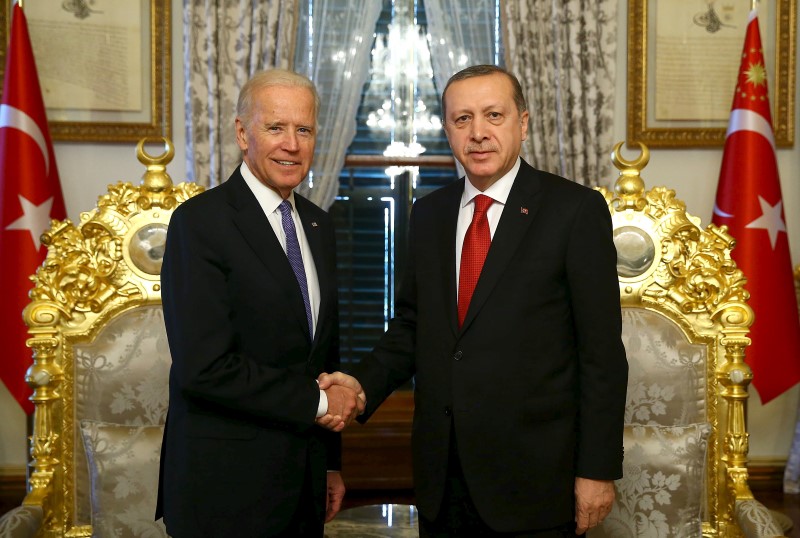By Can Sezer and Roberta Rampton
ISTANBUL/WASHINGTON (Reuters) - Turkish President Tayyip Erdogan will have a bilateral meeting with U.S. Vice President Joe Biden during a visit to Washington this week, but a senior U.S. official declined to say whether formal talks with President Barack Obama were planned.
Erdogan will be among more than 50 world leaders attending a Nuclear Security Summit in Washington on Thursday and Friday.
There has been intense speculation in the Turkish media as to whether he would meet Obama, with some suggesting a failure to do so would be a deliberate U.S. snub amid differences over Syria and U.S. concerns over the direction of Turkey's domestic policies.
At a press conference in Istanbul before leaving for the United States earlier on Tuesday, Erdogan said a meeting with Obama at the nuclear summit was planned, although he said he did not know how long it would last.
Biden's office later said the vice president would host Erdogan for a meeting on Thursday in Washington.
A senior U.S. administration official said Obama and Erdogan "will have the opportunity to talk at the summit" but did not have any scheduling updates.
"We've got a lot of important business with the Turks to do, and we've made important progress through that diplomacy," White House spokesman Josh Earnest said on Monday, when asked about reports that a request from Erdogan to meet with Obama had been rejected.
"I would anticipate that that diplomacy will continue when President Erdogan visits the United States to attend a Nuclear Security Summit later this week," he said.
NATO member Turkey is part of the U.S.-led coalition fighting Islamic State in Syria and Iraq, but Washington and Ankara are sharply divided over a Kurdish militia in northern Syria. The militia has enjoyed U.S. military support, but Turkey sees it as a threat to its own national security.
Washington has also grown increasingly critical of Turkey's record on freedom of expression. Biden said during a visit in January that Turkey was setting a poor example in intimidating media and accusing academics of treason.
Erdogan, meanwhile, said on Tuesday he wanted the U.S. authorities to take steps against a network of schools run by a movement affiliated with Islamic preacher Fethullah Gulen, a U.S.-based Turkish cleric whom he has accused of running a "parallel" state and of plotting to overthrow him.
Erdogan was once an ally of Gulen, whose network of followers runs schools worldwide. The two publicly fell out after police and prosecutors Erdogan saw as sympathetic to Gulen launched a graft probe that touched on the Turkish leader's inner circle in 2013.
Gulen, who faces terrorism charges in Turkey, denies his followers tried to topple Erdogan.
The arrest last week in Florida of a Turkish-Iranian gold trader who was at the centre of that graft investigation, was not a concern for Turkey, Erdogan also said.

"The real money launderers are there (in the United States). Have the authorities taken any steps towards them?," Erdogan said in reference to Gulen's network.
